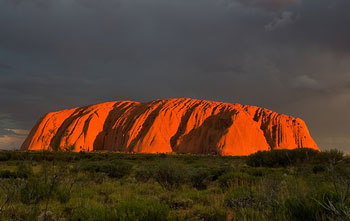 To me, the Northern Territory is Australia. That’s not to say that the rest of the country doesn’t have much going on, it certainly does, but the Northern Territory is the Australia of my boyhood. When, as a twelve year old, I fantasized about visiting the land Down Under, my mind imagined vast expanses, Aboriginal bushmen, frill-necked lizards, kangaroos taller than my father, giant red rocks, ferocious crocodiles and the endlessly vacant outback – and this iconic version of Australia, the stuff of childhood dreams, really does exist in the Northern Territory.
To me, the Northern Territory is Australia. That’s not to say that the rest of the country doesn’t have much going on, it certainly does, but the Northern Territory is the Australia of my boyhood. When, as a twelve year old, I fantasized about visiting the land Down Under, my mind imagined vast expanses, Aboriginal bushmen, frill-necked lizards, kangaroos taller than my father, giant red rocks, ferocious crocodiles and the endlessly vacant outback – and this iconic version of Australia, the stuff of childhood dreams, really does exist in the Northern Territory.
It’s in the territory after all where the majority of Australia’s crocs reside, and where Sweetheart, the country’s most famous crocodile—notorious for attacking boats—made her nest. It’s the territory where many Aboriginal young men still go on “walkabout” when they come of age and where most of Australia’s indigenous population lives. It’s the territory that Mick Dundee called home, in the movie Crocodile Dundee, which (let’s admit it) informed most of our early opinions on the country and the territory where frilled necked lizards leave their dens during the wet season, escaping predators by running on their hind legs. It’s even the territory where red kangaroos, known to grow as tall as six and a half feet, hop through the scrub brush at the base of Uluru, Australia’s red-rock centerpiece.
And since Australia’s Northern Territory is twice as large as the state of California with 1/200th of the population, it’s the most ideal place to carve out a little elbow room and explore the outback. Here are my top-ten must-visit spots in “The Territory”:
1 – Uluru
The navel of Australia isn’t just a national icon; it’s also one of the most sacred Aboriginal sites that the country has on offer and certainly one of the most beautiful on a grand scale. Standing next to Uluru, glowing red in the afternoon sun, while reading the dreaming stories retold by the Anangu people for tens of thousands of years, a person feels humbled but at the same time connected rather than insignificant. Few places on the planet can offer such a depth of emotion.
2 – Kata Tjuta
Resting in the same National Park, and a mere ten miles away from Uluru, the domed formations of Kata Tjuta are often thought of as even more striking by travelers. Which makes it stranger still to learn that only 25% of the visitors to Uluru-Kata-Tjuta National Park stop off there at all. One wonders, once you’ve gone all that way (because the Red Center is not close to anything else in the whole country) why not push on those extra ten miles? Those who do discover that it’s infinitely worth it —and the Valley of the Winds walk, following a path through the domes carved by rushing wind for millions of years, is an experience that won’t soon be forgotten.
3 – Kakadu National Park
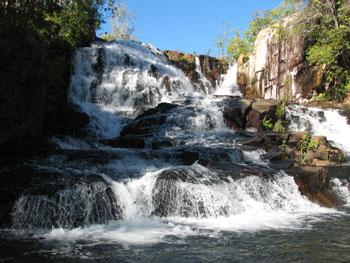 Before I ever set foot on Australian soil I was surprised to find Kakadu National Park ranked above even the mighty Uluru in a book titled: 100 Places in Australia That Australians Should See Before They Die. Now, having spent a combined month tramping through the park, I know why.
Before I ever set foot on Australian soil I was surprised to find Kakadu National Park ranked above even the mighty Uluru in a book titled: 100 Places in Australia That Australians Should See Before They Die. Now, having spent a combined month tramping through the park, I know why.
Kakadu, located in the Territory’s “top-end” is as diverse and fascinating as the country itself. It is a massive park, 12,305 square miles (roughly the size of Israel) with a wildly varied ecology. Grasslands, mangrove swamps, deciduous forests, savanna and monsoon rainforests all flourish here creating a wide variety of animal habitats.
Cruising the Yellow Water Billabong at sunset to spot birds, crocodiles and the occasional buffalo is an absolute must. Also be sure not to miss the rock art and panoramic wetland vistas at Ubirr or the opportunity for a swim at Jim Jim Falls, Gunlom Falls (where parts of Crocodile Dundee were filmed) or Maguk Plunge Pool.
4 – Kings Canyon
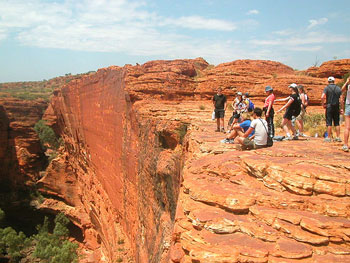 This spot is the least visited of Central Australia’s big three (behind Uluru and Kata Tjuta) but those who do visit are in for a treat.
This spot is the least visited of Central Australia’s big three (behind Uluru and Kata Tjuta) but those who do visit are in for a treat.
The Rim Walk, around the top of the canyon, indulges hikers with hundreds of egg-shaped sandstone domes unfolding across the horizon, wide vistas of the surrounding stone country and vertigo inducing looks 330 feet down to the valley floor below.
Inside of the canyon there is a small, wind-protected swimming hole perfect for refreshing tired hikers and for taking in the much more comfortable view up the sheer walls.
5 – Animal Tracks Safari
It is not my business to blatantly plug a safari company. But in all my time in Australia I have seen an endless string of travelers disappointed because they were not able to have an experience in which they gained access to genuine Aboriginal culture. Animal Tracks does just that in a way that honors Aboriginal Heritage rather than exploiting it. With an Aboriginal guide, guests track crocs and learn to find wild carrots, yams, grubs and sugar bag (native honey). Later they use fire sticks to get a blaze going for roasting crocodile, kangaroo and barramundi on an underground oven. This is a perfect way for kids to learn about this fascinating culture and pick up a few basic survival skills.
6 – Litchfield National Park
Go to Litchfield on a hot Saturday and you’ll get a master’s class on how Territorians stay cool. The park is Mother Nature’s take on Wild Rivers, a circuit of amazing swimming holes and cliff jumps. The finest gem among them is Walker Creek where you can reserve a shady campsite and have a natural swimming pool, carved by river against rock, all to yourself—water monitor lizards and butterflies included.
7 – Darwin
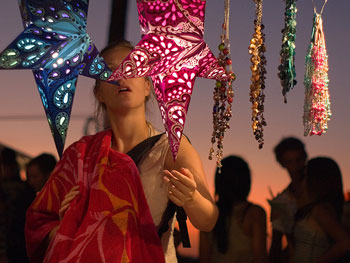 The largest population center in the Territory, Darwin is far from being a booming metropolis. The town has a quaint feel and it’s easy to explore the sidewalk bars and harbor side parks by foot. Be sure to visit the sprawling Mindil Beach Sunset Market (Thursday & Sunday only), pretty much the only place I’ve ever been where you can feast on an endless variety of local and international dishes, purchase a bottle of organic honey, get a massage and watch monkey hand puppets play the bongos all in one night. Another great way to acquaint yourself with the city is to hop aboard the Alfred Nobel for a dinner cruise with Darwin Harbor Cruises. The cruise is a perfectly relaxing chance to learn the history of Australia’s second most famous harbor while indulging in oysters, shrimp and barbecued barramundi.
The largest population center in the Territory, Darwin is far from being a booming metropolis. The town has a quaint feel and it’s easy to explore the sidewalk bars and harbor side parks by foot. Be sure to visit the sprawling Mindil Beach Sunset Market (Thursday & Sunday only), pretty much the only place I’ve ever been where you can feast on an endless variety of local and international dishes, purchase a bottle of organic honey, get a massage and watch monkey hand puppets play the bongos all in one night. Another great way to acquaint yourself with the city is to hop aboard the Alfred Nobel for a dinner cruise with Darwin Harbor Cruises. The cruise is a perfectly relaxing chance to learn the history of Australia’s second most famous harbor while indulging in oysters, shrimp and barbecued barramundi.
8 – Douglas Hot Springs
Normally when I think hot springs I think of mildly warm water that smells overpoweringly of sulfur. But not Douglas. Here the water bubbles up boiling hot through a sandy creek bed and converges with a cool water section of running river. The resulting mix comes at any temperature that you could desire (from scalding to tepid). Sitting in the steaming pools at dusk with your legs trailing in the current is the all the spa you’ll ever need up in the Territory. Keep your eyes peeled for the two beautiful olive pythons living in the hollow tree stump at the water’s edge.
9 – Katherine George
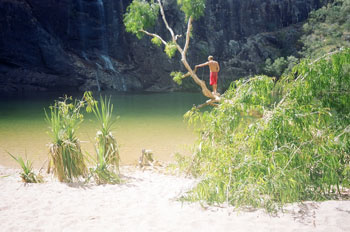 My favorite experience in Australia may very well be the 41-mile, five day Jatbula Trail tracing the Edith River near Katherine. Arrive in the early part of the dry season (when the rivers are safe from saltwater crocs but there’s still lots of water flowing) and you will experience some of the most stunning, yet isolated scenery the territory has to share. Each day of hiking leads to a new, separate, and totally unpopulated waterhole with natural slides, cliffs to jump off of and animals of all sorts to spot including the rare frill-necked lizard. The hike winds through grassy savannah, swampy wetlands, and rough stone country—sometimes all three in a day, before dropping you at another empty, spectacular campsite.
My favorite experience in Australia may very well be the 41-mile, five day Jatbula Trail tracing the Edith River near Katherine. Arrive in the early part of the dry season (when the rivers are safe from saltwater crocs but there’s still lots of water flowing) and you will experience some of the most stunning, yet isolated scenery the territory has to share. Each day of hiking leads to a new, separate, and totally unpopulated waterhole with natural slides, cliffs to jump off of and animals of all sorts to spot including the rare frill-necked lizard. The hike winds through grassy savannah, swampy wetlands, and rough stone country—sometimes all three in a day, before dropping you at another empty, spectacular campsite.
10 – Arnhem Land
Abutting Kakadu National park, this vast Aboriginal Land Trust is difficult for tourists to access but worth the effort ten-times over. Arnhem Land has the same various beauty as Kakadu without the infrastructure or crowds. More importantly, this is the spot to go if you are looking to connect with indigenous people living in the traditional manner. Some of the area can be accessed by tourists who hold permits, reserved far in advance. If you aren’t planning a year out a better option comes around in July, when the Aboriginal Community at Oenpelli (near the Kakadu-Arnhem Land Border) hosts an “Open Day”. There, visitors can see the works of traditional artists, practice spear throwing, enjoy local music and dance and watch a footy match between neighboring communities. A month later, on the isolated Gove Peninsula in North East Arnhem Land, the Garma Culture Festival kicks off, a weeklong opportunity for visitors to see the intact cultural traditions of the Yolngu people who have inhabited the peninsula continuously throughout the course of history. It may take a little research to access Arnhem Land but the opportunity to interact with Aboriginal communities on their land and on their terms is absolutely invaluable.
So there it is. The Northern Territory in all its croc filled, scorched earth, wild, sprawling, epic glory. In danger of sounding far too gushy: let me wager that this is the Down Under you’ve always dreamed of.
When to go
To visit the Top-End try the end of May till the first week in July when the water holes are full but the crocs have moved out of them. The Red Center is great any time but keep in mind that summer temperatures regularly climb upwards of a hundred and ten degrees.
Photo credits:
Uluru by Peter Nijenhuis on Flickr, Kings Canyon by Lyndi&Jason on Flickr, Darwin sunset market by grun2000 on Flickr, Swimming hole and Gunlom Falls by Steve Bramucci